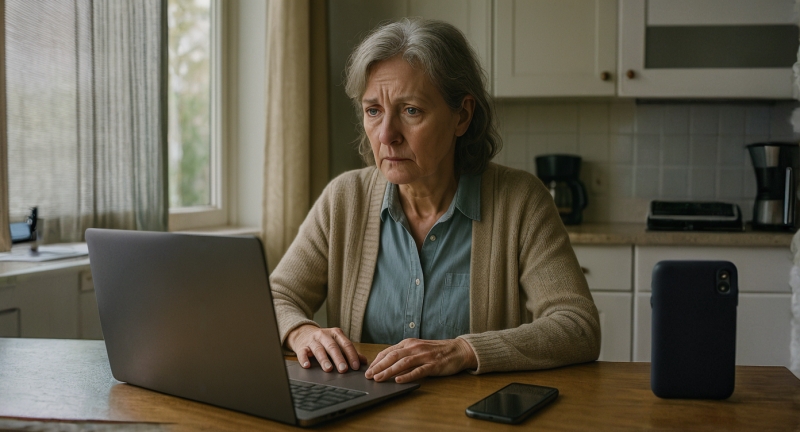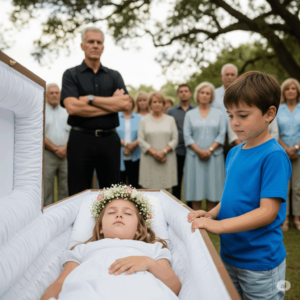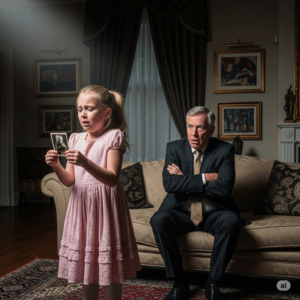
My name is Margaret Collins. I’m 59 years old, a widow and I live in a quiet neighborhood in Oregon. I’ve worked as an office manager at a law firm for nearly two decades, raised two children Emily, my daughter who just turned 32, and Luke, my 29-year-old son, and spent most of my adult life making sure they never had to struggle the way I did.
Last Tuesday, I received an email that changed everything. It was from Emily, no subject line, just her name sitting in my inbox. I smiled before opening it, thinking maybe it was a quick update, or a sweet note before her big day.
We had just spoken about her wedding plans a few weeks ago. I had already contributed $30,000 to help her book the venue, secure a photographer, and reserve the florist she loved since college. But when I opened the email, the smile vanished.
Mom, the email started No dear mom, just mom like a label. Emily explained that she, along with her fiance Andrew and his family, had finalized the guest list for the ceremony in Napa Valley. And after much thought, they decided it was best for me to watch the wedding via livestream, not in person.
She added that Andrew’s mother was particular about the guest count and wanted to keep things intimate. At the end, she included a line that felt like salt in an open wound. If you want to be a part of it, you can watch through the Google Meet link we’ve created.
Should be just like being there, lol. lol I stared at that screen for a long time. My coffee grew cold.
My hands didn’t tremble. I didn’t cry. Something inside me quietly shifted, like the ground had cracked open but I was still standing.
I replied with just four words sure. Enjoy your big day. No emotion, no argument, just a quiet withdrawal.
And I knew, deep down, that those four words would echo louder than any scream. I didn’t want to fight. I didn’t want tears, I wanted clarity.
I wanted the silence to speak for itself. I closed the laptop, finished my now cold coffee, and got ready for work like it was any other Tuesday. But it wasn’t.
That was the day I stopped pretending that my sacrifices meant anything to my daughter. That was the day everything began to change. The drive to the office that morning was quiet.
Oregon’s early spring air still held a chill, but I barely noticed. My mind kept circling the same question, how did we get here? I’ve spent 18 years working at Caldwell Walker Law. It’s not glamorous but it’s stable.
And stability was what I needed after my husband died suddenly when the kids were still teenagers. I remember standing in front of our old washing machine, bills spread across the counter, trying to figure out how to pay for both groceries and Emily’s upcoming college deposit. Back then I didn’t think twice about giving up my weekends.
I took extra shifts, cancelled vacations, skipped birthdays. I told myself there’ll be time for me later. There never was.
Every penny I saved went to Emily and Luke, when Emily changed majors twice and needed more credits, I paid. When she moved across the country for a short-lived job in New York, I covered her deposit and plane ticket. When she cried through her second breakup at 27, I flew out, held her hand, and made her tea in a kitchen that didn’t feel like home.
When Luke wanted to buy a house with his fiancée, I co-signed the mortgage, and wrote the first $10,000 check without hesitation. I never kept score, that’s what mothers do right. But that email made me feel like a transaction, like I had been useful, and now I wasn’t.
Like I had a shelf life, and it had expired. Back at the office, my boss Robert stopped by my desk. He’s one of those rare men who remembers birthdays and how you take your coffee.
He noticed something was off right away. You look like you’ve seen a ghost, he said, setting a lat from the cafe downstairs on my desk. I wanted to tell him.
I wanted to say my daughter just disinvited me from her wedding, but instead, I smiled and said I hadn’t slept well. He didn’t push. That small act of kindness the coffee.
The silence nearly undid me. After all the noise in my head that morning, it reminded me that I still existed. That I still mattered, even if only quietly.
Around lunchtime, my phone buzzed. Emily again. Her name lit up my screen like a spotlight I didn’t want.
Voicemails, texts. Mom, please answer, we need to talk, this isn’t funny. I didn’t listen to any of them, not yet.
I just sat there, sipping my latte, and thought, maybe it’s time to stop being the one who always answers. Maybe it’s time to stop playing a role in someone else’s story when they won’t let you on the stage. That afternoon, I made a decision that would shift the ground beneath all of us.
I wasn’t going to scream. I wasn’t going to beg. I was going to do something far more powerful.
I was going to act. After work, I didn’t go straight home. I drove to First Federal Bank, a few blocks down from the office.
Carlos, the branch manager, had helped me with everything from setting up college funds to adjusting retirement contributions. He always greeted me by name. Mrs. Collins, he smiled, standing to shake my hand.
What can I do for you today? I sat down across from him and placed my purse on the floor. My voice was calm, almost too calm. I need to cancel a wire transfer, I said.
He blinked. The one to the Napa venue? Yes, that one. Carlos hesitated.
There may be a cancellation fee depending on timing but may I ask why? The circumstances have changed, I replied, without elaborating. He looks something up on his screen. You’re in luck.
It hasn’t processed yet. Just in time. He paused, then looked up at me.
Are you sure, Mrs. Collins? $50,000 is a significant amount. I nodded. I’m sure.
$50,000. That was the amount I had planned to send next, on top of the $30,000 already gone. $80,000 total.
For a wedding I wasn’t allowed to attend. I signed the necessary forms and left the bank without a second thought. By the time I got home, there were nine missed calls from Emily, two from Luke.
One voicemail simply said, Mom, please. Don’t do this. I turned off my phone.
In the kitchen, I reached for the bottle of red wine I’d been saving for Thanksgiving. I hadn’t opened it back then. Emily was supposed to visit but she cancelled last minute.
Work, she said. I poured a glass, took it out to the porch, and sat in the fading sunlight. Birds chirped in the trees.
A neighbor’s dog barked. Everything felt still. And then the memories started coming in waves.
All the birthdays I planned alone. All the holiday dinners where I pretended I wasn’t waiting for a call that never came. All the small sacrifices that nobody noticed.
The new shoes I didn’t buy. The car I drove for 14 years. The vacations I postponed.
I thought about Andrew’s mother the woman who barely knew Emily yet her opinion carried more weight than mine. The woman whose idea of family meant excluding the one person who had carried Emily through every hard season of her life. I thought about the way Emily signed off her email with LOL.
As if watching your own daughter’s wedding through a screen was a joke. And finally I thought about myself, not as a mother, not as a widow, but as a woman. What did I want? Um.
Peace. Dignity. A life that didn’t revolve around being useful to people who only showed up when they needed something.
That night, around 9 PM, the doorbell rang. I thought about ignoring it. But curiosity got the better of me.
It was Luke. Still in his office clothes, tie loosened, sleeves rolled up. He looked uncomfortable, holding his phone in one hand like a shield.
Mom, he said, stepping inside before I could speak. Why aren’t you answering your phone? Emily’s freaking out. I shut the door calmly.
Hello to you too. He sighed, already pacing. She says you’re not coming to the wedding now, that you’re being difficult.
I laughed, difficult. For not attending a wedding I was uninvited from? He shifted uncomfortably. Andrew’s parents are footing most of the bill, mom.
You know how traditional they are. I raised an eyebrow. Traditional? I already paid $30,000.
I was about to give $50,000 more. That’s not tradition, that’s a B-out. He froze.
Wait, you were sending another $50? Was, I said, sipping my wine. But not anymore. Luke’s face went pale.
Mom, they’re counting on that. The venue, the food, the… Not my problem anymore, I said evenly. His voice rose.
Of course it’s your problem, she’s your daughter. And I’m her mother, I said quietly. A mother who was told to stay home and watch from a screen.
He ran his hands through his hair, visibly agitated. You always make everything about yourself. And that was it.
That was the moment something inside me finally gave way. Get out of my house. What? You heard me Luke, get out.
Mom? No, I said, firm but soft. I’ve given everything I had, and I’m done being the villain in a story I wrote with love. Luke stood there for a second longer, then turned and walked out.
The door clicked behind him quietly, but it felt louder than any slam. I stood in the middle of my living room, heart pounding and realized something startling. I didn’t feel guilty.
I felt free. The next morning I woke up to 43 missed calls, and a string of frantic messages from Emily. They started with passive-aggressive aggressive guilt.
Mom, we need to talk. Why are you doing this? This is childish. Then the tone shifted.
The venue just called. The payment didn’t go through. We’re going to lose everything if we don’t pay by tomorrow.
Andrew’s parents are furious. They said this proves they were right about you. At 3.24 AM, she sent.
I don’t understand why you’re doing this to me. I smiled into my coffee. Of course she didn’t understand.
Emily had grown up with my sacrifices woven so tightly into her life that she never stopped to question where the comfort came from. The security. The stability.
She just assumed it would always be there. That I would always be there. But not this time.
Later that morning while I was reviewing contracts at my desk, an email popped up in my personal inbox. The subject line read. Please don’t ruin my wedding.
I opened it without expectation. Mom, she wrote. I know you’re upset about the livestream situation but this is extreme, we’ve lost the venue deposit, and if we don’t pay the remaining balance by end of day Paris time, the caterer walks.
Andrew’s parents are beyond upset. They’re saying this proves you can’t be reasoned with. Please don’t do this, we can talk about you attending the ceremony, but we need the funds first.
There it was. They were willing to talk about letting me attend, now that the money was gone. Not an apology.
Not a reflection. A negotiation. As if my presence at my own daughter’s wedding could be bartered, bought, or sold depending on how generous I was feeling.
I didn’t respond. I closed the email and turned back to my work. Around noon Robert stopped by my desk.
Lunch, he offered. That new Italian place just opened. I almost declined, as I usually did.
But something in me shifted. Maybe it was the clarity of the past 24 hours. Maybe I just needed to sit somewhere that didn’t ask anything from me.
So I nodded. I’d like that. Over pasta, he told me about his grandkids and how exhausting but beautiful it was to chase after them.
His eyes were soft. Real. He paused and said gently forgive me Margaret, but you seem lighter today.
I surprised myself. I told him everything. About Emily.
The email. The wedding. The money.
And what I did. When I finished he didn’t judge, he didn’t try to fix anything. He just said.
Sometimes the hardest part of love is setting boundaries. Especially with the people we’ve given the most to. He reached across the table and briefly squeezed my hand.
I think you did the right thing. For the first time in a long time I believed that too. When I returned to my desk there were more calls.
More texts. But I didn’t answer. I didn’t need to.
Because for the first time my silence spoke volumes. That evening, as I pulled into my driveway, the sky was already dimming. The porch light clicked on automatically.
Everything looked still peaceful, even. But there was someone sitting on my front steps. As I got closer, I recognized her.
Sophia. She stood up quickly, brushing invisible lint from her coat. Sophia had been Emily’s best friend since fifth grade.
She spent countless weekends at our house, baking cookies, watching movies, giggling in sleeping bags until dawn. I hadn’t seen her in years. Mrs. Collins, she said softly.
I’m sorry to drop by like this. It’s fine, I replied, unlocking the door. Would you like some tea? She followed me into the kitchen, her eyes scanning the familiar walls like they held old echoes.
I filled the kettle and waited. Emily sent you? I finally asked. She didn’t answer right away.
Then, she’s a mess. They lost the venue. The florist dropped out.
Andrew’s parents are threatening to cancel the wedding. I said nothing, placing two mugs on the counter. She’s panicking, Sophia continued.
She knows she messed up, she just doesn’t know how to fix it. Is that why you’re here, I asked, to fix it? She shook her head. No, I’m here to ask, is there anything she can say or do to change your mind? I paused.
Was there? Would an apology change the way it felt to be excluded, to be used like a bank account, to be told you’re not welcome unless your money is? I looked at Sophia, still young, still hopeful. No, I said quietly. There isn’t.
Her shoulder sagged, not even if she apologizes. I handed her a mug of tea. Words are easy, Sophia.
Especially when people are desperate. But the people who love you, they don’t wait until you cut them off to see you. Sophia looked down into her tea, nodding slowly.
I get it, she said. Even if she doesn’t. I’m sorry, Mrs. Collins.
You don’t need to be, I replied. We stood in silence for a moment, two women from different generations connected by one hard truth. Sometimes love has limits.
Sometimes the only way to be seen, is to walk away. Sophia didn’t stay long. She didn’t try to argue.
She just thanked me, hugged me gently, and walked back into the night. And I, I finally closed the door on a version of myself I had long outgrown. The wedding never happened not as they planned, anyway.
They scrambled to find another venue, but everything was either booked or far too expensive without the money I had once promised. According to Luke, they ended up doing a small backyard ceremony weeks later, just a few relatives and Andrew’s parents. I wasn’t invited.
And this time, I didn’t need to be. In the weeks that followed, Emily sent one more email. A long one.
Emotional. Half apology half justification. I read it once, then archived it.
I wasn’t angry anymore, just done. There’s a strange peace that comes with letting go not in rage, but in clarity. For the first time in decades, I woke up not wondering who needed something from me.
Not bracing for another guilt trip disguised as love. I made a new rule for myself. If my presence is negotiable, then so is my effort.
I go to work. I read novels. I joined a pottery class.
I have dinner with friends who see me, not what I can give them. And I’ve learned something I wish I’d known sooner. You don’t have to burn yourself to keep others warm.
If this story resonated with you, share it. Comment below. And don’t forget to like and subscribe.
Sometimes, the strongest kind of love, is the one you finally give to yourself.





